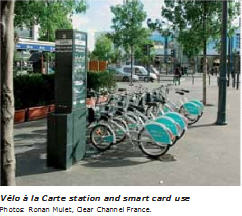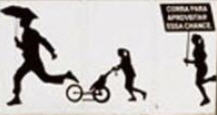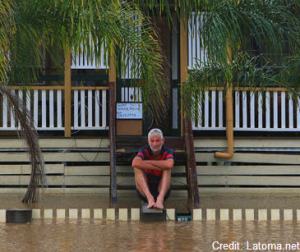To negotiate the move from old to new mobility, we have to understand as well the importance of moving from old to new economics. Back in 1997 James  Robertson, respected British economist, monetary reformer and policy counsel to government, took a hard look at "The New Economics of Sustainable Development" in a report prepared for the Forward Studies Unit of the European Commission. Today, half a generation later, this exceptionally insightful piece still brings up points to which we should be giving attention. It is unfortunate that the clock has stood still for this important part of the sustainability dialogue. No wonder we are making so very little progress in the right direction. Let's have a close look at what James has to propose and mull it all over from a 2011 perspective.
Robertson, respected British economist, monetary reformer and policy counsel to government, took a hard look at "The New Economics of Sustainable Development" in a report prepared for the Forward Studies Unit of the European Commission. Today, half a generation later, this exceptionally insightful piece still brings up points to which we should be giving attention. It is unfortunate that the clock has stood still for this important part of the sustainability dialogue. No wonder we are making so very little progress in the right direction. Let's have a close look at what James has to propose and mull it all over from a 2011 perspective.
Monday, June 27, 2011
The New Economics of Sustainable Development
Saturday, June 25, 2011
Bike-Sharing: 2011 State of the European Union report
As regular readers of World Streets by now know well, we consider bicycles as the mine canaries of sustainable transport and sustainable  cities. When you can hear them singing, everything is going pretty much in the right direction. But silence or absence, and hey you are in deep trouble. As part of our long-term watching brief under our free-for-all World City Bike Collaborative since 2005, we try to keep track of what is going on both at the leading and the lagging edge with both bikes and infrastructure, and public bicycle systems, in all parts of the world, from China and Africa, to Paris and Portland.
cities. When you can hear them singing, everything is going pretty much in the right direction. But silence or absence, and hey you are in deep trouble. As part of our long-term watching brief under our free-for-all World City Bike Collaborative since 2005, we try to keep track of what is going on both at the leading and the lagging edge with both bikes and infrastructure, and public bicycle systems, in all parts of the world, from China and Africa, to Paris and Portland.
Friday, June 24, 2011
Climate of Denial: Can science and the truth withstand the merchants of poison?
 From the New York Times, 22 June 2011: "Former Vice President Al Gore sharply criticized President Obama as lacking leadership on climate changein a magazine essay published online Wednesday, saying his policies had been little more effective than those of President George W. Bush. In the 7,000-word article in Rolling Stone, Mr. Gore said . . . "
From the New York Times, 22 June 2011: "Former Vice President Al Gore sharply criticized President Obama as lacking leadership on climate changein a magazine essay published online Wednesday, saying his policies had been little more effective than those of President George W. Bush. In the 7,000-word article in Rolling Stone, Mr. Gore said . . . "
Thursday, June 23, 2011
Going down? Newman and Kenworthy on Peak Car Use
This is an important article. It appears simultaneously in the Summer of  2011 edition of our sister publication, the Journal of World Transport Policy and Practice. With a view to ensuring its broadest international readership we are posting it here with pleasure, and with permission of the authors. We do this with particular interest on the grounds that their central thesis -- that is, our faster than one might have expected evolving attitudes toward car ownership and use -- is one that is central to the preoccupations of World Streets and all our associated programs.
2011 edition of our sister publication, the Journal of World Transport Policy and Practice. With a view to ensuring its broadest international readership we are posting it here with pleasure, and with permission of the authors. We do this with particular interest on the grounds that their central thesis -- that is, our faster than one might have expected evolving attitudes toward car ownership and use -- is one that is central to the preoccupations of World Streets and all our associated programs.
Wednesday, June 22, 2011
Bike-Share Thriving in Africa
Bike sharing, despite all that is going on world wide in many places, is still very much a new concept that still harbors many unknowns. Including a very wide range of "business plans" as needed to get them started and keep them going. Associate editor, Gail Jennings, reports on how bike sharing looks from an African perspective.
--> Read on:Tuesday, June 21, 2011
Help Wanted Department: Donald Appleyard is (almost) not on Wikipedia
 To: John Whitelegg, Editor, WTPP
To: John Whitelegg, Editor, WTPP
Dear John, Your editorial and latest edition of World Transport got me to thinking once again about the great work of Donald Appleyard -- to the extent in which I have decided to make his 1981 publication of Livable Streets into a significant milestone in the process of sustainable development accomplishment and awareness in the context of the course which I am currently developing at – http://sustain.ecoplan.org
Monday, June 20, 2011
World Transport Policy & Practice – Vol. 17, No. 2
 The Journal of World Transport Policy and Practice is the long-standing idea and print partner of World Streets and the New Mobility Agenda since 1995. The Summer 2011 edition appears with articles by Bruce Appleyard, Joshua Hart and Graham Parkhurst, and Peter Newman and Jeff Kenworthy. In the article that follows you will find the lead editorial by founding editor John Whitelegg. (For a more complete introduction to World Transport click here.)
The Journal of World Transport Policy and Practice is the long-standing idea and print partner of World Streets and the New Mobility Agenda since 1995. The Summer 2011 edition appears with articles by Bruce Appleyard, Joshua Hart and Graham Parkhurst, and Peter Newman and Jeff Kenworthy. In the article that follows you will find the lead editorial by founding editor John Whitelegg. (For a more complete introduction to World Transport click here.)
- - - > To obtain your copy of WTPP 17/2 click here.
Friday, June 17, 2011
Women2Drive: A Day to be remembered in The Kingdom and beyond.
It is a rare day that World Streets comes out in favor  of cars in cities. But even that of course is not quite true. At best there will be plenty of cars in our cities, but they will not be parked and they will be chauffeuring not just their drivers but offering affordable services to flexible groups of people safely and efficiently. Great way to get around when you get it right.
of cars in cities. But even that of course is not quite true. At best there will be plenty of cars in our cities, but they will not be parked and they will be chauffeuring not just their drivers but offering affordable services to flexible groups of people safely and efficiently. Great way to get around when you get it right.
And getting it right is the theme of the day today in the Kingdom of Saudi Arabia, where, as you all surely are aware, a few – we will possibly never know the exact number – Saudi women have decided that they have a rightful place in society, in the public space, and that this also includes being behind the wheel when they need to get somewhere. And today is their great day: Women2Drive is social media-driven campaign and sisterhood project in which a certain number of intrepid women are getting behind the wheel and defying the Kingdom's long ban on female drivers. Here is a fine article from the New York Times introducing the topic, and for more we and our readers will be adding more in the days to come.
La femme est l'avenir de l'homme. Or in English: Go for it Sisters.
Thursday, June 16, 2011
Look at this street & tell us what is happening in . . .
Iran? Most of us have some pretty truncated ideas about the pace and quality of daily life in this large and important country, which has, for various historical  reasons, been cut off from the mainstream of international exchange, policy and practice when it comes to their streets. The simple truth is this. Every morning in Iran, some seventy-eight million women, men and children wake up to start their day, and they have to get to work, school, shopping, the hospital, visit friends and relatives, and all the other tasks and obligations of everyday life. It is important that these trips be safe, healthy and efficient.
reasons, been cut off from the mainstream of international exchange, policy and practice when it comes to their streets. The simple truth is this. Every morning in Iran, some seventy-eight million women, men and children wake up to start their day, and they have to get to work, school, shopping, the hospital, visit friends and relatives, and all the other tasks and obligations of everyday life. It is important that these trips be safe, healthy and efficient.
Wednesday, June 15, 2011
Every day is a great day to take a few cars off the street and think about it.
Mid-year 2011 update at World Car Free Days Here you have a quick update of the materials and sources available on the topic from the World Car Free Days Consortium and several other key sources.
Here you have a quick update of the materials and sources available on the topic from the World Car Free Days Consortium and several other key sources.
Monday, June 13, 2011
Op-ed: Geo-Engineering Can Help Save the Planet?
 This piece from the New York Times, June 10, 2011, takes quite another approach than the one which is the main subject of our program here, where we for the most part concentrate on the near-term demand management, strategic supply expansion, and mitigation side of all this. It would be a grand thing if we could just wait for the technologists to solve the problems of our planet, without actually having to change ourselves (the hard bit). So let's invoke equal time and have a look at what Dr. Lovejoy has to offer. You never know. Maybe we can just relax and keep on going as in the past.
This piece from the New York Times, June 10, 2011, takes quite another approach than the one which is the main subject of our program here, where we for the most part concentrate on the near-term demand management, strategic supply expansion, and mitigation side of all this. It would be a grand thing if we could just wait for the technologists to solve the problems of our planet, without actually having to change ourselves (the hard bit). So let's invoke equal time and have a look at what Dr. Lovejoy has to offer. You never know. Maybe we can just relax and keep on going as in the past.
New tools: Assessing damage of the Queensland Flood – 3
 These ‘new’ tools are amazing and in this case, were produced very quickly. However as with most innovations (?), the consequences are often more interesting. What has happened of course is that it has become obvious that despite the state and local government knowing the risk of flood in these flooded areas is very high (in geological terms, just look at the landscape), the fact the history only extends a little over 100 years of reliable evidence in western scientific terms, means that relying on the assessed risk is very unreliable.
These ‘new’ tools are amazing and in this case, were produced very quickly. However as with most innovations (?), the consequences are often more interesting. What has happened of course is that it has become obvious that despite the state and local government knowing the risk of flood in these flooded areas is very high (in geological terms, just look at the landscape), the fact the history only extends a little over 100 years of reliable evidence in western scientific terms, means that relying on the assessed risk is very unreliable.
Saturday, June 11, 2011
Free Parking Is for Socialists
Down with Free Auto Parking! Up with Free Market Parking!
- by Michael Andersen
 THERE'S NOTHING like watching the degenerates of NW 23rd to make you wonder when liberal America's war on families is going to end.
THERE'S NOTHING like watching the degenerates of NW 23rd to make you wonder when liberal America's war on families is going to end.What frightens me most about this neighborhood isn't the decadence. It's the entitlement. These people now insist that the rest of us open our wallets to extend them special benefits at public expense.
I'm speaking, of course, of free automobile parking. --> Read on:
Wednesday, June 1, 2011
Walkability Assessment in 13 Asian Cities
The poor state of pedestrian facilities in some Asian cities was highlighted in the report published by the Asian Development Bank and the Clean Air Initiative for Asian Cities. Ironically, the lowest walkability ratings are found to be along public transport terminals and schools where footpaths, pedestrian amenities and access for persons-with-disabilities are sorely lacking.
--> Read on:

